
The Project Gutenberg EBook Adventures of Tom Sawyer, by Twain, V3 #107 in our series by Mark Twain (Samuel Clemens) Copyright laws are changing all over the world. Be sure to check the copyright laws for your country before downloading or redistributing this or any other Project Gutenberg eBook. This header should be the first thing seen when viewing this Project Gutenberg file. Please do not remove it. Do not change or edit the header without written permission. Please read the "legal small print," and other information about the eBook and Project Gutenberg at the bottom of this file. Included is important information about your specific rights and restrictions in how the file may be used. You can also find out about how to make a donation to Project Gutenberg, and how to get involved. **Welcome To The World of Free Plain Vanilla Electronic Texts** **EBooks Readable By Both Humans and By Computers, Since 1971** *****These EBooks Were Prepared By Thousands of Volunteers***** Title: The Adventures of Tom Sawyer, Volume 3. Author: Mark Twain (Samuel Clemens) Release Date: December 2004 [EBook #7195] [This file was first posted on March 26, 2003] Edition: 10 Language: English Character set encoding: ASCII *** START OF THE PROJECT GUTENBERG EBOOK TOM SAWYER, TWAIN, V3 *** This file was produced by David Widger, [widger@cecomet.net]





CHAPTER VIII. Tom Decides on his Course--Old Scenes Re-enacted
CHAPTER IX. A Solemn Situation--Grave Subjects Introduced--Injun Joe Explains
CHAPTER X. The Solemn Oath--Terror Brings Repentance--Mental Punishment
CHAPTER XI. Muff Potter Comes Himself--Tom's Conscience at Work
CHAPTER XII. Tom Shows his Generosity--Aunt Polly Weakens
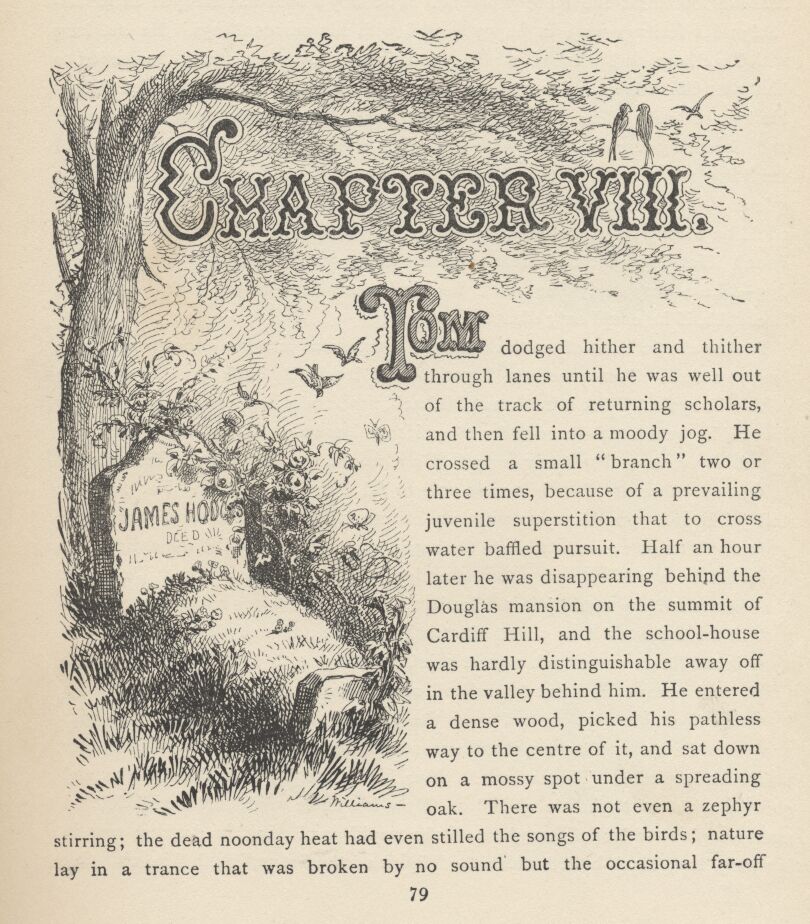
TOM dodged hither and thither through lanes until he was well out of the track of returning scholars, and then fell into a moody jog. He crossed a small "branch" two or three times, because of a prevailing juvenile superstition that to cross water baffled pursuit. Half an hour later he was disappearing behind the Douglas mansion on the summit of Cardiff Hill, and the school-house was hardly distinguishable away off in the valley behind him. He entered a dense wood, picked his pathless way to the centre of it, and sat down on a mossy spot under a spreading oak. There was not even a zephyr stirring; the dead noonday heat had even stilled the songs of the birds; nature lay in a trance that was broken by no sound but the occasional far-off hammering of a wood-pecker, and this seemed to render the pervading silence and sense of loneliness the more profound. The boy's soul was steeped in melancholy; his feelings were in happy accord with his surroundings. He sat long with his elbows on his knees and his chin in his hands, meditating. It seemed to him that life was but a trouble, at best, and he more than half envied Jimmy Hodges, so lately released; it must be very peaceful, he thought, to lie and slumber and dream forever and ever, with the wind whispering through the trees and caressing the grass and the flowers over the grave, and nothing to bother and grieve about, ever any more. If he only had a clean Sunday-school record he could be willing to go, and be done with it all. Now as to this girl. What had he done? Nothing. He had meant the best in the world, and been treated like a dog—like a very dog. She would be sorry some day—maybe when it was too late. Ah, if he could only die TEMPORARILY!
But the elastic heart of youth cannot be compressed into one constrained shape long at a time. Tom presently began to drift insensibly back into the concerns of this life again. What if he turned his back, now, and disappeared mysteriously? What if he went away—ever so far away, into unknown countries beyond the seas—and never came back any more! How would she feel then! The idea of being a clown recurred to him now, only to fill him with disgust. For frivolity and jokes and spotted tights were an offense, when they intruded themselves upon a spirit that was exalted into the vague august realm of the romantic. No, he would be a soldier, and return after long years, all war-worn and illustrious. No— better still, he would join the Indians, and hunt buffaloes and go on the warpath in the mountain ranges and the trackless great plains of the Far West, and away in the future come back a great chief, bristling with feathers, hideous with paint, and prance into Sunday-school, some drowsy summer morning, with a blood-curdling war-whoop, and sear the eyeballs of all his companions with unappeasable envy. But no, there was something gaudier even than this. He would be a pirate! That was it! NOW his future lay plain before him, and glowing with unimaginable splendor. How his name would fill the world, and make people shudder! How gloriously he would go plowing the dancing seas, in his long, low, black-hulled racer, the Spirit of the Storm, with his grisly flag flying at the fore! And at the zenith of his fame, how he would suddenly appear at the old village and stalk into church, brown and weather-beaten, in his black velvet doublet and trunks, his great jack-boots, his crimson sash, his belt bristling with horse-pistols, his crime-rusted cutlass at his side, his slouch hat with waving plumes, his black flag unfurled, with the skull and crossbones on it, and hear with swelling ecstasy the whisperings, "It's Tom Sawyer the Pirate!—the Black Avenger of the Spanish Main!"
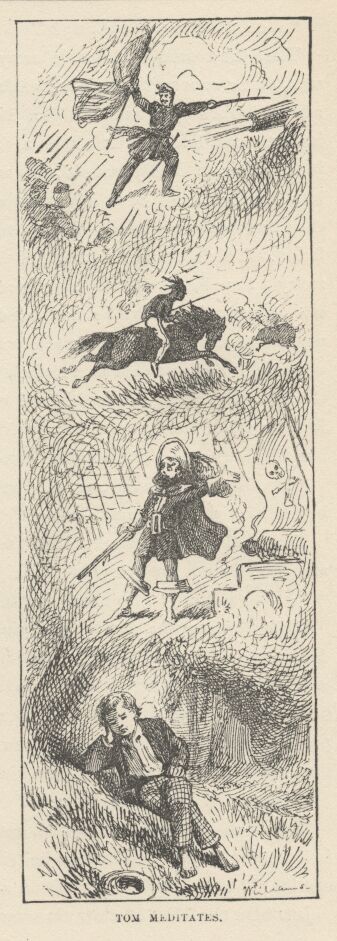
Yes, it was settled; his career was determined. He would run away from home and enter upon it. He would start the very next morning. Therefore he must now begin to get ready. He would collect his resources together. He went to a rotten log near at hand and began to dig under one end of it with his Barlow knife. He soon struck wood that sounded hollow. He put his hand there and uttered this incantation impressively:
"What hasn't come here, come! What's here, stay here!"
Then he scraped away the dirt, and exposed a pine shingle. He took it up and disclosed a shapely little treasure-house whose bottom and sides were of shingles. In it lay a marble. Tom's astonishment was bound-less! He scratched his head with a perplexed air, and said:
"Well, that beats anything!"
Then he tossed the marble away pettishly, and stood cogitating. The truth was, that a superstition of his had failed, here, which he and all his comrades had always looked upon as infallible. If you buried a marble with certain necessary incantations, and left it alone a fortnight, and then opened the place with the incantation he had just used, you would find that all the marbles you had ever lost had gathered themselves together there, meantime, no matter how widely they had been separated. But now, this thing had actually and unquestionably failed. Tom's whole structure of faith was shaken to its foundations. He had many a time heard of this thing succeeding but never of its failing before. It did not occur to him that he had tried it several times before, himself, but could never find the hiding-places afterward. He puzzled over the matter some time, and finally decided that some witch had interfered and broken the charm. He thought he would satisfy himself on that point; so he searched around till he found a small sandy spot with a little funnel-shaped depression in it. He laid himself down and put his mouth close to this depression and called—
"Doodle-bug, doodle-bug, tell me what I want to know! Doodle-bug, doodle-bug, tell me what I want to know!"
The sand began to work, and presently a small black bug appeared for a second and then darted under again in a fright.
"He dasn't tell! So it WAS a witch that done it. I just knowed it."
He well knew the futility of trying to contend against witches, so he gave up discouraged. But it occurred to him that he might as well have the marble he had just thrown away, and therefore he went and made a patient search for it. But he could not find it. Now he went back to his treasure-house and carefully placed himself just as he had been standing when he tossed the marble away; then he took another marble from his pocket and tossed it in the same way, saying:
"Brother, go find your brother!"
He watched where it stopped, and went there and looked. But it must have fallen short or gone too far; so he tried twice more. The last repetition was successful. The two marbles lay within a foot of each other.
Just here the blast of a toy tin trumpet came faintly down the green aisles of the forest. Tom flung off his jacket and trousers, turned a suspender into a belt, raked away some brush behind the rotten log, disclosing a rude bow and arrow, a lath sword and a tin trumpet, and in a moment had seized these things and bounded away, barelegged, with fluttering shirt. He presently halted under a great elm, blew an answering blast, and then began to tiptoe and look warily out, this way and that. He said cautiously—to an imaginary company:
"Hold, my merry men! Keep hid till I blow."
Now appeared Joe Harper, as airily clad and elaborately armed as Tom. Tom called:
"Hold! Who comes here into Sherwood Forest without my pass?"
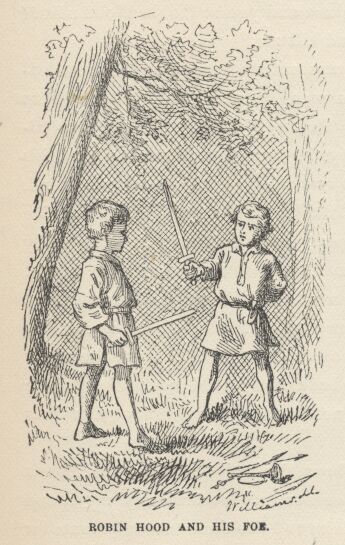
"Guy of Guisborne wants no man's pass. Who art thou that—that—"
"Dares to hold such language," said Tom, prompting—for they talked "by the book," from memory.
"Who art thou that dares to hold such language?"
"I, indeed! I am Robin Hood, as thy caitiff carcase soon shall know."
"Then art thou indeed that famous outlaw? Right gladly will I dispute with thee the passes of the merry wood. Have at thee!"
They took their lath swords, dumped their other traps on the ground, struck a fencing attitude, foot to foot, and began a grave, careful combat, "two up and two down." Presently Tom said:
"Now, if you've got the hang, go it lively!"
So they "went it lively," panting and perspiring with the work. By and by Tom shouted:
"Fall! fall! Why don't you fall?"
"I sha'n't! Why don't you fall yourself? You're getting the worst of it."
"Why, that ain't anything. I can't fall; that ain't the way it is in the book. The book says, 'Then with one back-handed stroke he slew poor Guy of Guisborne.' You're to turn around and let me hit you in the back."
There was no getting around the authorities, so Joe turned, received the whack and fell.
"Now," said Joe, getting up, "you got to let me kill YOU. That's fair."
"Why, I can't do that, it ain't in the book."
"Well, it's blamed mean—that's all."
"Well, say, Joe, you can be Friar Tuck or Much the miller's son, and lam me with a quarter-staff; or I'll be the Sheriff of Nottingham and you be Robin Hood a little while and kill me."
This was satisfactory, and so these adventures were carried out. Then Tom became Robin Hood again, and was allowed by the treacherous nun to bleed his strength away through his neglected wound. And at last Joe, representing a whole tribe of weeping outlaws, dragged him sadly forth, gave his bow into his feeble hands, and Tom said, "Where this arrow falls, there bury poor Robin Hood under the greenwood tree." Then he shot the arrow and fell back and would have died, but he lit on a nettle and sprang up too gaily for a corpse.
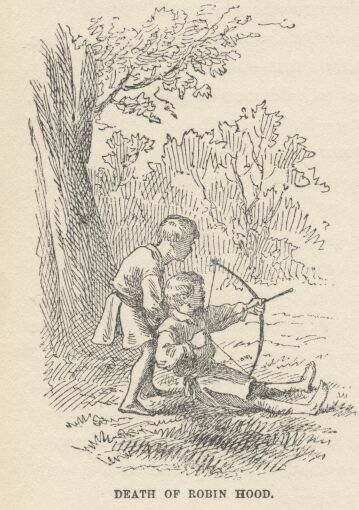
The boys dressed themselves, hid their accoutrements, and went off grieving that there were no outlaws any more, and wondering what modern civilization could claim to have done to compensate for their loss. They said they would rather be outlaws a year in Sherwood Forest than President of the United States forever.
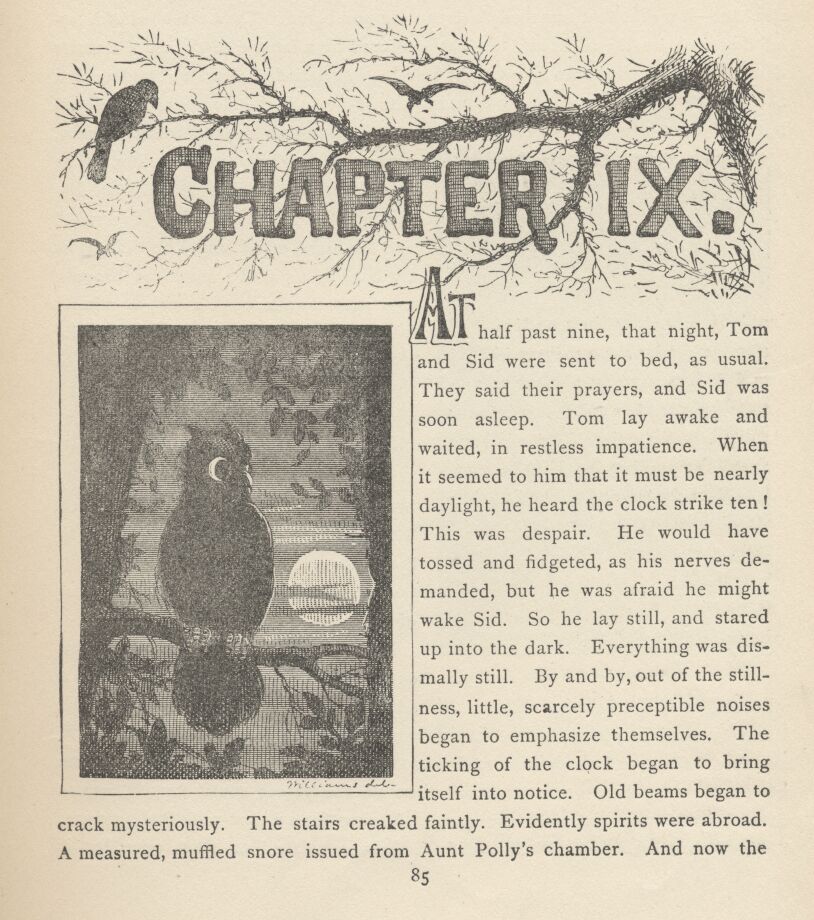
AT half-past nine, that night, Tom and Sid were sent to bed, as usual. They said their prayers, and Sid was soon asleep. Tom lay awake and waited, in restless impatience. When it seemed to him that it must be nearly daylight, he heard the clock strike ten! This was despair. He would have tossed and fidgeted, as his nerves demanded, but he was afraid he might wake Sid. So he lay still, and stared up into the dark. Everything was dismally still. By and by, out of the stillness, little, scarcely preceptible noises began to emphasize themselves. The ticking of the clock began to bring itself into notice. Old beams began to crack mysteriously. The stairs creaked faintly. Evidently spirits were abroad. A measured, muffled snore issued from Aunt Polly's chamber. And now the tiresome chirping of a cricket that no human ingenuity could locate, began. Next the ghastly ticking of a death-watch in the wall at the bed's head made Tom shudder—it meant that somebody's days were numbered. Then the howl of a far-off dog rose on the night air, and was answered by a fainter howl from a remoter distance. Tom was in an agony. At last he was satisfied that time had ceased and eternity begun; he began to doze, in spite of himself; the clock chimed eleven, but he did not hear it. And then there came, mingling with his half-formed dreams, a most melancholy caterwauling. The raising of a neighboring window disturbed him. A cry of "Scat! you devil!" and the crash of an empty bottle against the back of his aunt's woodshed brought him wide awake, and a single minute later he was dressed and out of the window and creeping along the roof of the "ell" on all fours. He "meow'd" with caution once or twice, as he went; then jumped to the roof of the woodshed and thence to the ground. Huckleberry Finn was there, with his dead cat. The boys moved off and disappeared in the gloom. At the end of half an hour they were wading through the tall grass of the graveyard.
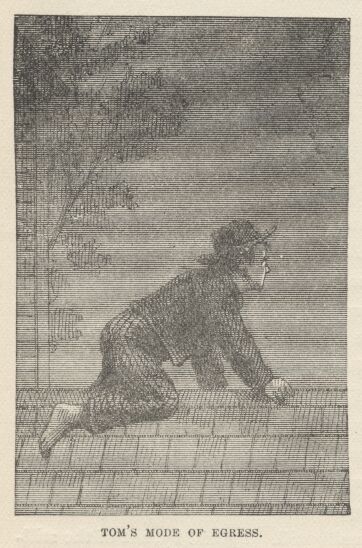
It was a graveyard of the old-fashioned Western kind. It was on a hill, about a mile and a half from the village. It had a crazy board fence around it, which leaned inward in places, and outward the rest of the time, but stood upright nowhere. Grass and weeds grew rank over the whole cemetery. All the old graves were sunken in, there was not a tombstone on the place; round-topped, worm-eaten boards staggered over the graves, leaning for support and finding none. "Sacred to the memory of" So-and-So had been painted on them once, but it could no longer have been read, on the most of them, now, even if there had been light.
A faint wind moaned through the trees, and Tom feared it might be the spirits of the dead, complaining at being disturbed. The boys talked little, and only under their breath, for the time and the place and the pervading solemnity and silence oppressed their spirits. They found the sharp new heap they were seeking, and ensconced themselves within the protection of three great elms that grew in a bunch within a few feet of the grave.
Then they waited in silence for what seemed a long time. The hooting of a distant owl was all the sound that troubled the dead stillness. Tom's reflections grew oppressive. He must force some talk. So he said in a whisper:
"Hucky, do you believe the dead people like it for us to be here?"
Huckleberry whispered:
"I wisht I knowed. It's awful solemn like, AIN'T it?"
"I bet it is."
There was a considerable pause, while the boys canvassed this matter inwardly. Then Tom whispered:
"Say, Hucky—do you reckon Hoss Williams hears us talking?"
"O' course he does. Least his sperrit does."
Tom, after a pause:
"I wish I'd said Mister Williams. But I never meant any harm. Everybody calls him Hoss."
"A body can't be too partic'lar how they talk 'bout these-yer dead people, Tom."
This was a damper, and conversation died again.
Presently Tom seized his comrade's arm and said:
"Sh!"
"What is it, Tom?" And the two clung together with beating hearts.
"Sh! There 'tis again! Didn't you hear it?"
"I—"
"There! Now you hear it."
"Lord, Tom, they're coming! They're coming, sure. What'll we do?"
"I dono. Think they'll see us?"
"Oh, Tom, they can see in the dark, same as cats. I wisht I hadn't come."
"Oh, don't be afeard. I don't believe they'll bother us. We ain't doing any harm. If we keep perfectly still, maybe they won't notice us at all."
"I'll try to, Tom, but, Lord, I'm all of a shiver."
"Listen!"
The boys bent their heads together and scarcely breathed. A muffled sound of voices floated up from the far end of the graveyard.
"Look! See there!" whispered Tom. "What is it?"
"It's devil-fire. Oh, Tom, this is awful."
Some vague figures approached through the gloom, swinging an old-fashioned tin lantern that freckled the ground with innumerable little spangles of light. Presently Huckleberry whispered with a shudder:
"It's the devils sure enough. Three of 'em! Lordy, Tom, we're goners! Can you pray?"
"I'll try, but don't you be afeard. They ain't going to hurt us. 'Now I lay me down to sleep, I—'"
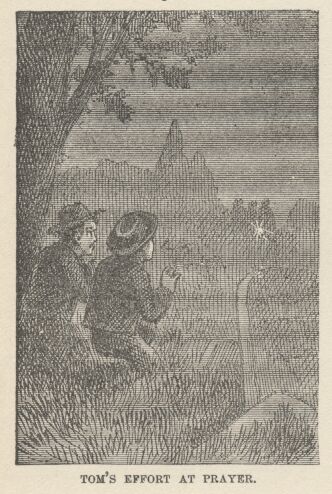
"Sh!"
"What is it, Huck?"
"They're HUMANS! One of 'em is, anyway. One of 'em's old Muff Potter's voice."
"No—'tain't so, is it?"
"I bet I know it. Don't you stir nor budge. He ain't sharp enough to notice us. Drunk, the same as usual, likely—blamed old rip!"
"All right, I'll keep still. Now they're stuck. Can't find it. Here they come again. Now they're hot. Cold again. Hot again. Red hot! They're p'inted right, this time. Say, Huck, I know another o' them voices; it's Injun Joe."
"That's so—that murderin' half-breed! I'd druther they was devils a dern sight. What kin they be up to?"
The whisper died wholly out, now, for the three men had reached the grave and stood within a few feet of the boys' hiding-place.
"Here it is," said the third voice; and the owner of it held the lantern up and revealed the face of young Doctor Robinson.
Potter and Injun Joe were carrying a handbarrow with a rope and a couple of shovels on it. They cast down their load and began to open the grave. The doctor put the lantern at the head of the grave and came and sat down with his back against one of the elm trees. He was so close the boys could have touched him.
"Hurry, men!" he said, in a low voice; "the moon might come out at any moment."
They growled a response and went on digging. For some time there was no noise but the grating sound of the spades discharging their freight of mould and gravel. It was very monotonous. Finally a spade struck upon the coffin with a dull woody accent, and within another minute or two the men had hoisted it out on the ground. They pried off the lid with their shovels, got out the body and dumped it rudely on the ground. The moon drifted from behind the clouds and exposed the pallid face. The barrow was got ready and the corpse placed on it, covered with a blanket, and bound to its place with the rope. Potter took out a large spring-knife and cut off the dangling end of the rope and then said:
"Now the cussed thing's ready, Sawbones, and you'll just out with another five, or here she stays."
"That's the talk!" said Injun Joe.
"Look here, what does this mean?" said the doctor. "You required your pay in advance, and I've paid you."
"Yes, and you done more than that," said Injun Joe, approaching the doctor, who was now standing. "Five years ago you drove me away from your father's kitchen one night, when I come to ask for something to eat, and you said I warn't there for any good; and when I swore I'd get even with you if it took a hundred years, your father had me jailed for a vagrant. Did you think I'd forget? The Injun blood ain't in me for nothing. And now I've GOT you, and you got to SETTLE, you know!"
He was threatening the doctor, with his fist in his face, by this time. The doctor struck out suddenly and stretched the ruffian on the ground. Potter dropped his knife, and exclaimed:
"Here, now, don't you hit my pard!" and the next moment he had grappled with the doctor and the two were struggling with might and main, trampling the grass and tearing the ground with their heels. Injun Joe sprang to his feet, his eyes flaming with passion, snatched up Potter's knife, and went creeping, catlike and stooping, round and round about the combatants, seeking an opportunity. All at once the doctor flung himself free, seized the heavy headboard of Williams' grave and felled Potter to the earth with it—and in the same instant the half-breed saw his chance and drove the knife to the hilt in the young man's breast. He reeled and fell partly upon Potter, flooding him with his blood, and in the same moment the clouds blotted out the dreadful spectacle and the two frightened boys went speeding away in the dark.
Presently, when the moon emerged again, Injun Joe was standing over the two forms, contemplating them. The doctor murmured inarticulately, gave a long gasp or two and was still. The half-breed muttered:
"THAT score is settled—damn you."
Then he robbed the body. After which he put the fatal knife in Potter's open right hand, and sat down on the dismantled coffin. Three—four— five minutes passed, and then Potter began to stir and moan. His hand closed upon the knife; he raised it, glanced at it, and let it fall, with a shudder. Then he sat up, pushing the body from him, and gazed at it, and then around him, confusedly. His eyes met Joe's.
"Lord, how is this, Joe?" he said.
"It's a dirty business," said Joe, without moving.
"What did you do it for?"
"I! I never done it!"
"Look here! That kind of talk won't wash."
Potter trembled and grew white.
"I thought I'd got sober. I'd no business to drink to-night. But it's in my head yet—worse'n when we started here. I'm all in a muddle; can't recollect anything of it, hardly. Tell me, Joe—HONEST, now, old feller—did I do it? Joe, I never meant to—'pon my soul and honor, I never meant to, Joe. Tell me how it was, Joe. Oh, it's awful—and him so young and promising."
"Why, you two was scuffling, and he fetched you one with the headboard and you fell flat; and then up you come, all reeling and staggering like, and snatched the knife and jammed it into him, just as he fetched you another awful clip—and here you've laid, as dead as a wedge til now."
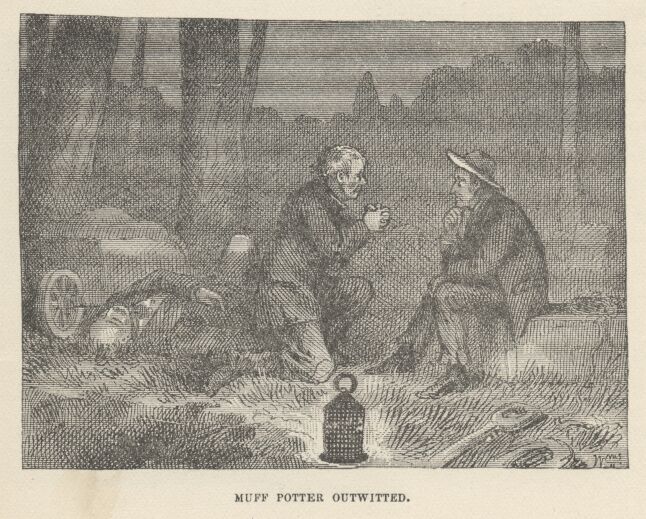
"Oh, I didn't know what I was a-doing. I wish I may die this minute if I did. It was all on account of the whiskey and the excitement, I reckon. I never used a weepon in my life before, Joe. I've fought, but never with weepons. They'll all say that. Joe, don't tell! Say you won't tell, Joe—that's a good feller. I always liked you, Joe, and stood up for you, too. Don't you remember? You WON'T tell, WILL you, Joe?" And the poor creature dropped on his knees before the stolid murderer, and clasped his appealing hands.
"No, you've always been fair and square with me, Muff Potter, and I won't go back on you. There, now, that's as fair as a man can say."
"Oh, Joe, you're an angel. I'll bless you for this the longest day I live." And Potter began to cry.
"Come, now, that's enough of that. This ain't any time for blubbering. You be off yonder way and I'll go this. Move, now, and don't leave any tracks behind you."
Potter started on a trot that quickly increased to a run. The half-breed stood looking after him. He muttered:
"If he's as much stunned with the lick and fuddled with the rum as he had the look of being, he won't think of the knife till he's gone so far he'll be afraid to come back after it to such a place by himself— chicken-heart!"
Two or three minutes later the murdered man, the blanketed corpse, the lidless coffin, and the open grave were under no inspection but the moon's. The stillness was complete again, too.
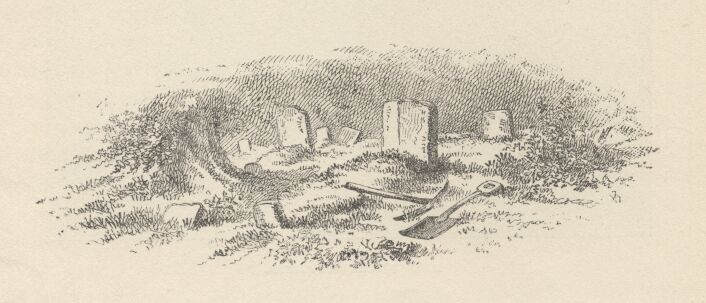
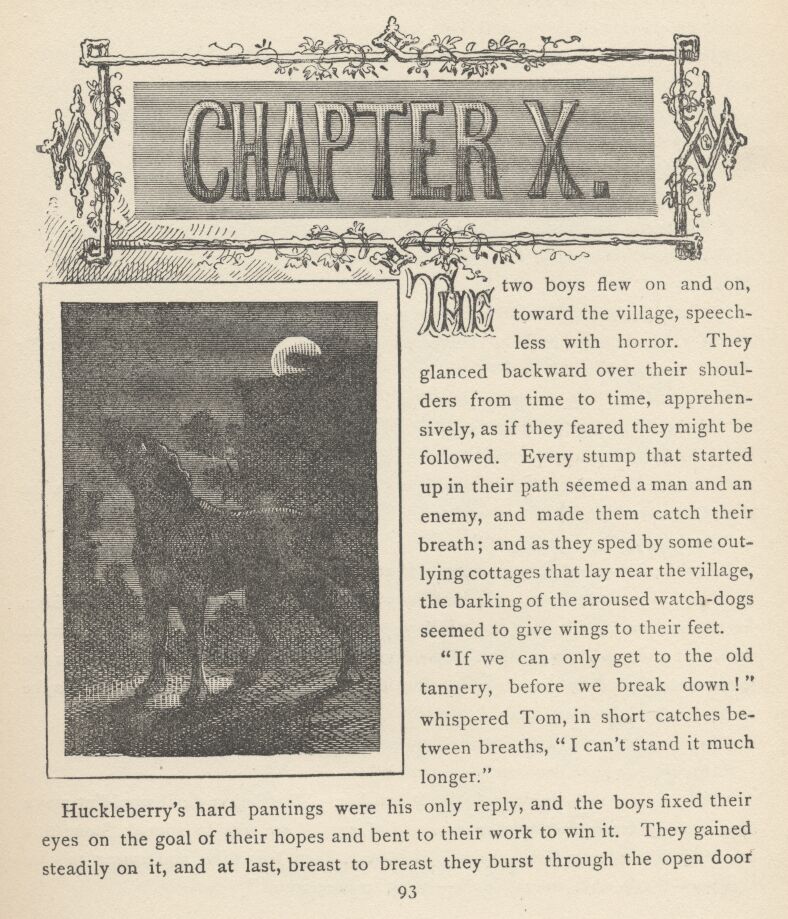
THE two boys flew on and on, toward the village, speechless with horror. They glanced backward over their shoulders from time to time, apprehensively, as if they feared they might be followed. Every stump that started up in their path seemed a man and an enemy, and made them catch their breath; and as they sped by some outlying cottages that lay near the village, the barking of the aroused watch-dogs seemed to give wings to their feet.
"If we can only get to the old tannery before we break down!" whispered Tom, in short catches between breaths. "I can't stand it much longer."
Huckleberry's hard pantings were his only reply, and the boys fixed their eyes on the goal of their hopes and bent to their work to win it. They gained steadily on it, and at last, breast to breast, they burst through the open door and fell grateful and exhausted in the sheltering shadows beyond. By and by their pulses slowed down, and Tom whispered:
"Huckleberry, what do you reckon'll come of this?"
"If Doctor Robinson dies, I reckon hanging'll come of it."
"Do you though?"
"Why, I KNOW it, Tom."
Tom thought a while, then he said:
"Who'll tell? We?"
"What are you talking about? S'pose something happened and Injun Joe DIDN'T hang? Why, he'd kill us some time or other, just as dead sure as we're a laying here."
"That's just what I was thinking to myself, Huck."
"If anybody tells, let Muff Potter do it, if he's fool enough. He's generally drunk enough."
Tom said nothing—went on thinking. Presently he whispered:
"Huck, Muff Potter don't know it. How can he tell?"
"What's the reason he don't know it?"
"Because he'd just got that whack when Injun Joe done it. D'you reckon he could see anything? D'you reckon he knowed anything?"
"By hokey, that's so, Tom!"
"And besides, look-a-here—maybe that whack done for HIM!"
"No, 'taint likely, Tom. He had liquor in him; I could see that; and besides, he always has. Well, when pap's full, you might take and belt him over the head with a church and you couldn't phase him. He says so, his own self. So it's the same with Muff Potter, of course. But if a man was dead sober, I reckon maybe that whack might fetch him; I dono."
After another reflective silence, Tom said:
"Hucky, you sure you can keep mum?"
"Tom, we GOT to keep mum. You know that. That Injun devil wouldn't make any more of drownding us than a couple of cats, if we was to squeak 'bout this and they didn't hang him. Now, look-a-here, Tom, less take and swear to one another—that's what we got to do—swear to keep mum."
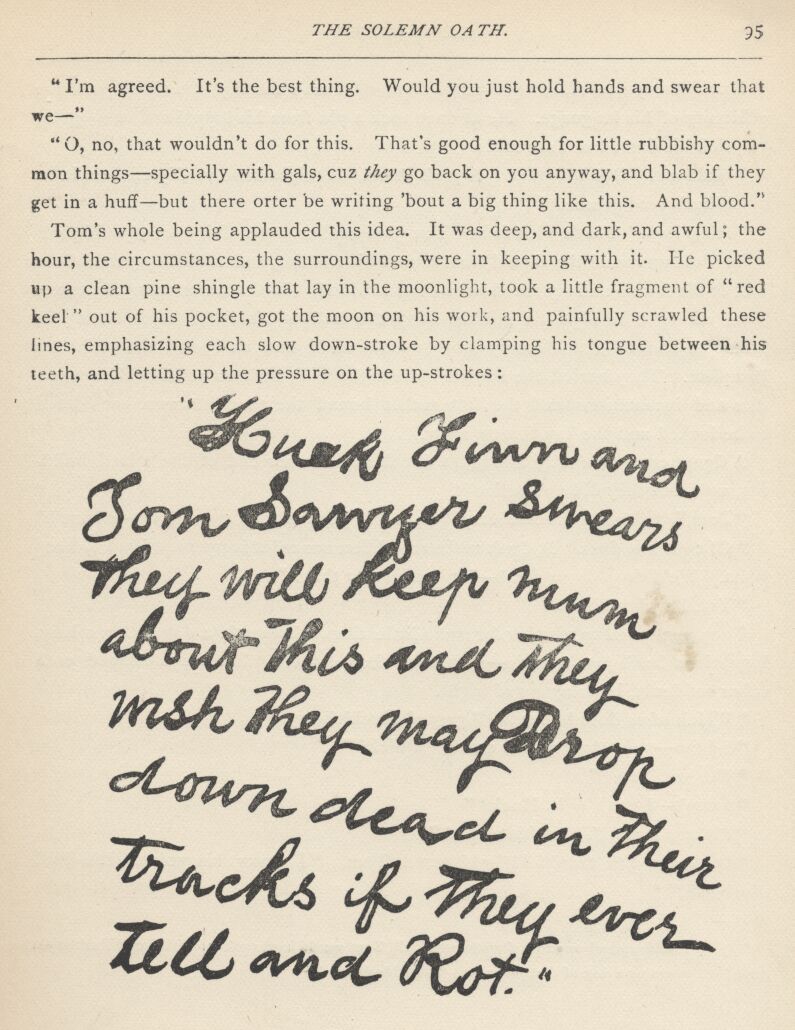
"I'm agreed. It's the best thing. Would you just hold hands and swear that we—"
"Oh no, that wouldn't do for this. That's good enough for little rubbishy common things—specially with gals, cuz THEY go back on you anyway, and blab if they get in a huff—but there orter be writing 'bout a big thing like this. And blood."
Tom's whole being applauded this idea. It was deep, and dark, and awful; the hour, the circumstances, the surroundings, were in keeping with it. He picked up a clean pine shingle that lay in the moon-light, took a little fragment of "red keel" out of his pocket, got the moon on his work, and painfully scrawled these lines, emphasizing each slow down-stroke by clamping his tongue between his teeth, and letting up the pressure on the up-strokes. [See next page.]
"Huck Finn and Tom Sawyer swears they will keep mum about This and They wish They may Drop down dead in Their Tracks if They ever Tell and Rot."
Huckleberry was filled with admiration of Tom's facility in writing, and the sublimity of his language. He at once took a pin from his lapel and was going to prick his flesh, but Tom said:
"Hold on! Don't do that. A pin's brass. It might have verdigrease on it."
"What's verdigrease?"
"It's p'ison. That's what it is. You just swaller some of it once— you'll see."
So Tom unwound the thread from one of his needles, and each boy pricked the ball of his thumb and squeezed out a drop of blood. In time, after many squeezes, Tom managed to sign his initials, using the ball of his little finger for a pen. Then he showed Huckleberry how to make an H and an F, and the oath was complete. They buried the shingle close to the wall, with some dismal ceremonies and incantations, and the fetters that bound their tongues were considered to be locked and the key thrown away.
A figure crept stealthily through a break in the other end of the ruined building, now, but they did not notice it.
"Tom," whispered Huckleberry, "does this keep us from EVER telling— ALWAYS?"
"Of course it does. It don't make any difference WHAT happens, we got to keep mum. We'd drop down dead—don't YOU know that?"
"Yes, I reckon that's so."
They continued to whisper for some little time. Presently a dog set up a long, lugubrious howl just outside—within ten feet of them. The boys clasped each other suddenly, in an agony of fright.
"Which of us does he mean?" gasped Huckleberry.
"I dono—peep through the crack. Quick!"
"No, YOU, Tom!"
"I can't—I can't DO it, Huck!"
"Please, Tom. There 'tis again!"
"Oh, lordy, I'm thankful!" whispered Tom. "I know his voice. It's Bull Harbison." *
[* If Mr. Harbison owned a slave named Bull, Tom would have spoken of him as "Harbison's Bull," but a son or a dog of that name was "Bull Harbison."]
"Oh, that's good—I tell you, Tom, I was most scared to death; I'd a bet anything it was a STRAY dog."
The dog howled again. The boys' hearts sank once more.
"Oh, my! that ain't no Bull Harbison!" whispered Huckleberry. "DO, Tom!"
Tom, quaking with fear, yielded, and put his eye to the crack. His whisper was hardly audible when he said:
"Oh, Huck, IT S A STRAY DOG!"
"Quick, Tom, quick! Who does he mean?"
"Huck, he must mean us both—we're right together."
"Oh, Tom, I reckon we're goners. I reckon there ain't no mistake 'bout where I'LL go to. I been so wicked."
"Dad fetch it! This comes of playing hookey and doing everything a feller's told NOT to do. I might a been good, like Sid, if I'd a tried —but no, I wouldn't, of course. But if ever I get off this time, I lay I'll just WALLER in Sunday-schools!" And Tom began to snuffle a little.
"YOU bad!" and Huckleberry began to snuffle too. "Consound it, Tom Sawyer, you're just old pie, 'long-side o' what I am. Oh, LORDY, lordy, lordy, I wisht I only had half your chance."
Tom choked off and whispered:
"Look, Hucky, look! He's got his BACK to us!"
Hucky looked, with joy in his heart.
"Well, he has, by jingoes! Did he before?"
"Yes, he did. But I, like a fool, never thought. Oh, this is bully, you know. NOW who can he mean?"
The howling stopped. Tom pricked up his ears.
"Sh! What's that?" he whispered.
"Sounds like—like hogs grunting. No—it's somebody snoring, Tom."
"That IS it! Where 'bouts is it, Huck?"
"I bleeve it's down at 'tother end. Sounds so, anyway. Pap used to sleep there, sometimes, 'long with the hogs, but laws bless you, he just lifts things when HE snores. Besides, I reckon he ain't ever coming back to this town any more."
The spirit of adventure rose in the boys' souls once more.
"Hucky, do you das't to go if I lead?"
"I don't like to, much. Tom, s'pose it's Injun Joe!"
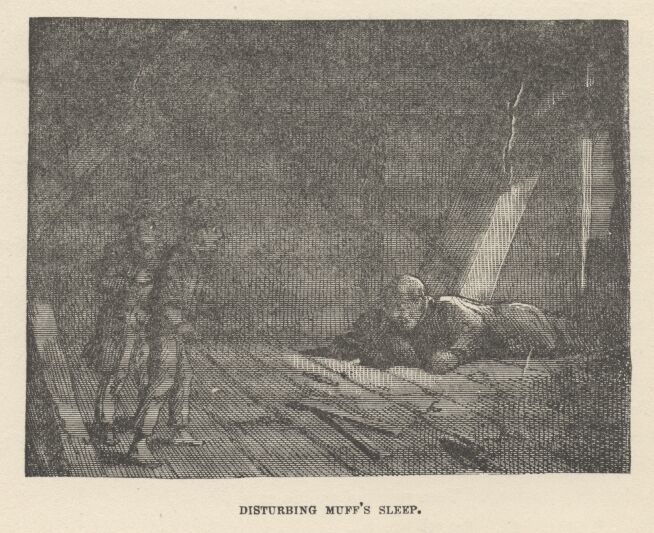
Tom quailed. But presently the temptation rose up strong again and the boys agreed to try, with the understanding that they would take to their heels if the snoring stopped. So they went tiptoeing stealthily down, the one behind the other. When they had got to within five steps of the snorer, Tom stepped on a stick, and it broke with a sharp snap. The man moaned, writhed a little, and his face came into the moonlight. It was Muff Potter. The boys' hearts had stood still, and their hopes too, when the man moved, but their fears passed away now. They tip-toed out, through the broken weather-boarding, and stopped at a little distance to exchange a parting word. That long, lugubrious howl rose on the night air again! They turned and saw the strange dog standing within a few feet of where Potter was lying, and FACING Potter, with his nose pointing heavenward.
"Oh, geeminy, it's HIM!" exclaimed both boys, in a breath.
"Say, Tom—they say a stray dog come howling around Johnny Miller's house, 'bout midnight, as much as two weeks ago; and a whippoorwill come in and lit on the banisters and sung, the very same evening; and there ain't anybody dead there yet."
"Well, I know that. And suppose there ain't. Didn't Gracie Miller fall in the kitchen fire and burn herself terrible the very next Saturday?"
"Yes, but she ain't DEAD. And what's more, she's getting better, too."
"All right, you wait and see. She's a goner, just as dead sure as Muff Potter's a goner. That's what the niggers say, and they know all about these kind of things, Huck."
Then they separated, cogitating. When Tom crept in at his bedroom window the night was almost spent. He undressed with excessive caution, and fell asleep congratulating himself that nobody knew of his escapade. He was not aware that the gently-snoring Sid was awake, and had been so for an hour.
When Tom awoke, Sid was dressed and gone. There was a late look in the light, a late sense in the atmosphere. He was startled. Why had he not been called—persecuted till he was up, as usual? The thought filled him with bodings. Within five minutes he was dressed and down-stairs, feeling sore and drowsy. The family were still at table, but they had finished breakfast. There was no voice of rebuke; but there were averted eyes; there was a silence and an air of solemnity that struck a chill to the culprit's heart. He sat down and tried to seem gay, but it was up-hill work; it roused no smile, no response, and he lapsed into silence and let his heart sink down to the depths.
After breakfast his aunt took him aside, and Tom almost brightened in the hope that he was going to be flogged; but it was not so. His aunt wept over him and asked him how he could go and break her old heart so; and finally told him to go on, and ruin himself and bring her gray hairs with sorrow to the grave, for it was no use for her to try any more. This was worse than a thousand whippings, and Tom's heart was sorer now than his body. He cried, he pleaded for forgiveness, promised to reform over and over again, and then received his dismissal, feeling that he had won but an imperfect forgiveness and established but a feeble confidence.
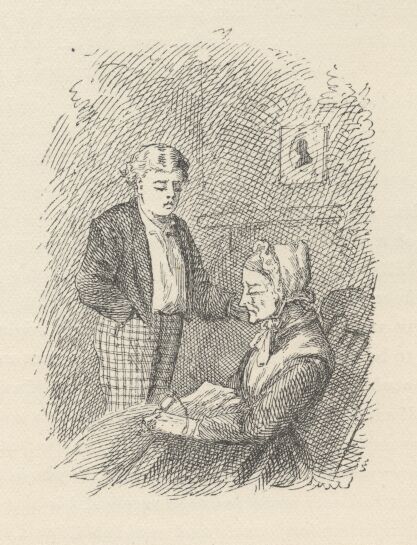
He left the presence too miserable to even feel revengeful toward Sid; and so the latter's prompt retreat through the back gate was unnecessary. He moped to school gloomy and sad, and took his flogging, along with Joe Harper, for playing hookey the day before, with the air of one whose heart was busy with heavier woes and wholly dead to trifles. Then he betook himself to his seat, rested his elbows on his desk and his jaws in his hands, and stared at the wall with the stony stare of suffering that has reached the limit and can no further go. His elbow was pressing against some hard substance. After a long time he slowly and sadly changed his position, and took up this object with a sigh. It was in a paper. He unrolled it. A long, lingering, colossal sigh followed, and his heart broke. It was his brass andiron knob!
This final feather broke the camel's back.
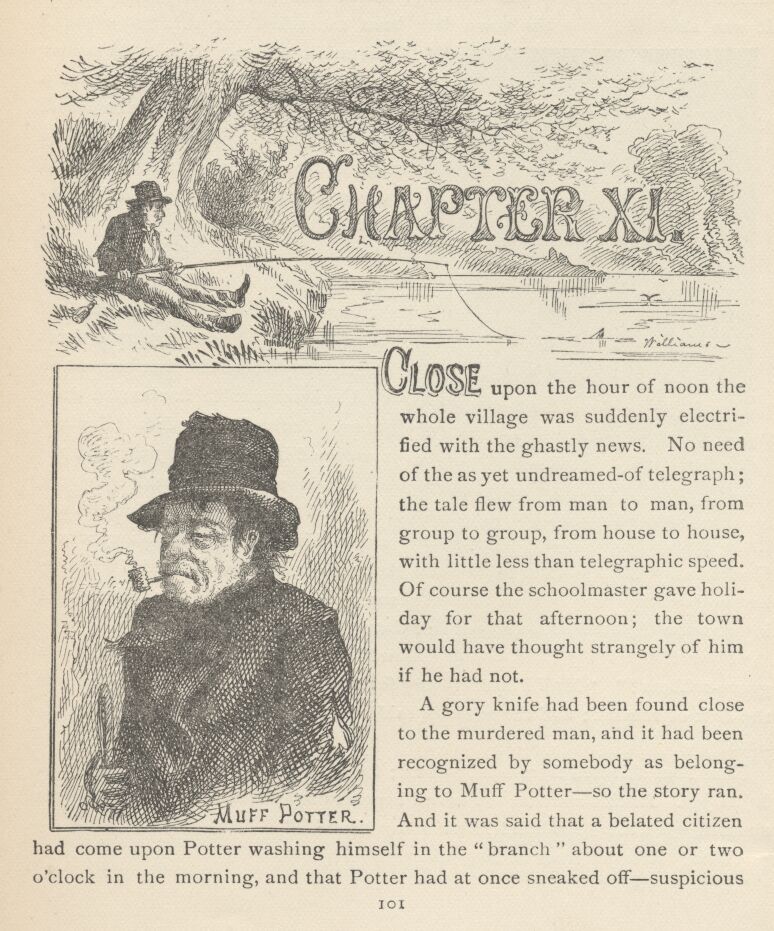
CLOSE upon the hour of noon the whole village was suddenly electrified with the ghastly news. No need of the as yet un-dreamed-of telegraph; the tale flew from man to man, from group to group, from house to house, with little less than telegraphic speed. Of course the schoolmaster gave holi-day for that afternoon; the town would have thought strangely of him if he had not.
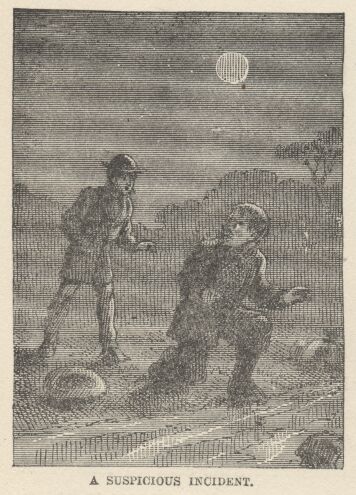
A gory knife had been found close to the murdered man, and it had been recognized by somebody as belonging to Muff Potter—so the story ran. And it was said that a belated citizen had come upon Potter washing himself in the "branch" about one or two o'clock in the morning, and that Potter had at once sneaked off—suspicious circumstances, especially the washing which was not a habit with Potter. It was also said that the town had been ransacked for this "murderer" (the public are not slow in the matter of sifting evidence and arriving at a verdict), but that he could not be found. Horsemen had departed down all the roads in every direction, and the Sheriff "was confident" that he would be captured before night.
All the town was drifting toward the graveyard. Tom's heartbreak vanished and he joined the procession, not because he would not a thousand times rather go anywhere else, but because an awful, unaccountable fascination drew him on. Arrived at the dreadful place, he wormed his small body through the crowd and saw the dismal spectacle. It seemed to him an age since he was there before. Somebody pinched his arm. He turned, and his eyes met Huckleberry's. Then both looked elsewhere at once, and wondered if anybody had noticed anything in their mutual glance. But everybody was talking, and intent upon the grisly spectacle before them.
"Poor fellow!" "Poor young fellow!" "This ought to be a lesson to grave robbers!" "Muff Potter'll hang for this if they catch him!" This was the drift of remark; and the minister said, "It was a judgment; His hand is here."
Now Tom shivered from head to heel; for his eye fell upon the stolid face of Injun Joe. At this moment the crowd began to sway and struggle, and voices shouted, "It's him! it's him! he's coming himself!"
"Who? Who?" from twenty voices.
"Muff Potter!"
"Hallo, he's stopped!—Look out, he's turning! Don't let him get away!"
People in the branches of the trees over Tom's head said he wasn't trying to get away—he only looked doubtful and perplexed.
"Infernal impudence!" said a bystander; "wanted to come and take a quiet look at his work, I reckon—didn't expect any company."
The crowd fell apart, now, and the Sheriff came through, ostentatiously leading Potter by the arm. The poor fellow's face was haggard, and his eyes showed the fear that was upon him. When he stood before the murdered man, he shook as with a palsy, and he put his face in his hands and burst into tears.
"I didn't do it, friends," he sobbed; "'pon my word and honor I never done it."
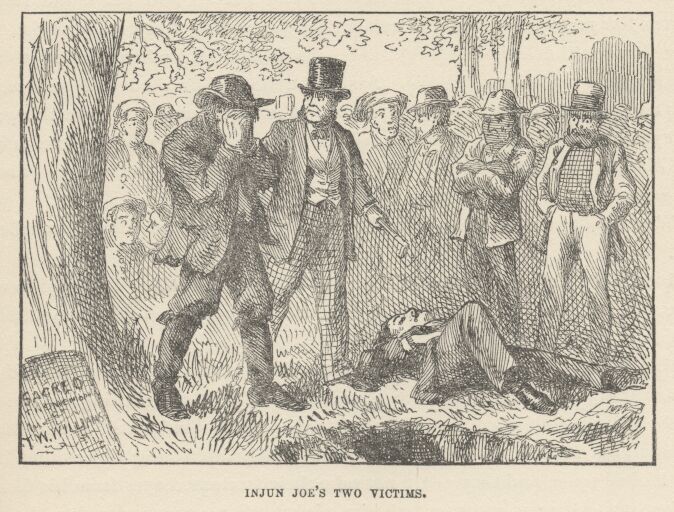
"Who's accused you?" shouted a voice.
This shot seemed to carry home. Potter lifted his face and looked around him with a pathetic hopelessness in his eyes. He saw Injun Joe, and exclaimed:
"Oh, Injun Joe, you promised me you'd never—"
"Is that your knife?" and it was thrust before him by the Sheriff.
Potter would have fallen if they had not caught him and eased him to the ground. Then he said:
"Something told me 't if I didn't come back and get—" He shuddered; then waved his nerveless hand with a vanquished gesture and said, "Tell 'em, Joe, tell 'em—it ain't any use any more."
Then Huckleberry and Tom stood dumb and staring, and heard the stony-hearted liar reel off his serene statement, they expecting every moment that the clear sky would deliver God's lightnings upon his head, and wondering to see how long the stroke was delayed. And when he had finished and still stood alive and whole, their wavering impulse to break their oath and save the poor betrayed prisoner's life faded and vanished away, for plainly this miscreant had sold himself to Satan and it would be fatal to meddle with the property of such a power as that.
"Why didn't you leave? What did you want to come here for?" somebody said.
"I couldn't help it—I couldn't help it," Potter moaned. "I wanted to run away, but I couldn't seem to come anywhere but here." And he fell to sobbing again.
Injun Joe repeated his statement, just as calmly, a few minutes afterward on the inquest, under oath; and the boys, seeing that the lightnings were still withheld, were confirmed in their belief that Joe had sold himself to the devil. He was now become, to them, the most balefully interesting object they had ever looked upon, and they could not take their fascinated eyes from his face.
They inwardly resolved to watch him nights, when opportunity should offer, in the hope of getting a glimpse of his dread master.
Injun Joe helped to raise the body of the murdered man and put it in a wagon for removal; and it was whispered through the shuddering crowd that the wound bled a little! The boys thought that this happy circumstance would turn suspicion in the right direction; but they were disappointed, for more than one villager remarked:
"It was within three feet of Muff Potter when it done it."
Tom's fearful secret and gnawing conscience disturbed his sleep for as much as a week after this; and at breakfast one morning Sid said:
"Tom, you pitch around and talk in your sleep so much that you keep me awake half the time."
Tom blanched and dropped his eyes.
"It's a bad sign," said Aunt Polly, gravely. "What you got on your mind, Tom?"
"Nothing. Nothing 't I know of." But the boy's hand shook so that he spilled his coffee.
"And you do talk such stuff," Sid said. "Last night you said, 'It's blood, it's blood, that's what it is!' You said that over and over. And you said, 'Don't torment me so—I'll tell!' Tell WHAT? What is it you'll tell?"
Everything was swimming before Tom. There is no telling what might have happened, now, but luckily the concern passed out of Aunt Polly's face and she came to Tom's relief without knowing it. She said:
"Sho! It's that dreadful murder. I dream about it most every night myself. Sometimes I dream it's me that done it."
Mary said she had been affected much the same way. Sid seemed satisfied. Tom got out of the presence as quick as he plausibly could, and after that he complained of toothache for a week, and tied up his jaws every night. He never knew that Sid lay nightly watching, and frequently slipped the bandage free and then leaned on his elbow listening a good while at a time, and afterward slipped the bandage back to its place again. Tom's distress of mind wore off gradually and the toothache grew irksome and was discarded. If Sid really managed to make anything out of Tom's disjointed mutterings, he kept it to himself.
It seemed to Tom that his schoolmates never would get done holding inquests on dead cats, and thus keeping his trouble present to his mind. Sid noticed that Tom never was coroner at one of these inquiries, though it had been his habit to take the lead in all new enterprises; he noticed, too, that Tom never acted as a witness—and that was strange; and Sid did not overlook the fact that Tom even showed a marked aversion to these inquests, and always avoided them when he could. Sid marvelled, but said nothing. However, even inquests went out of vogue at last, and ceased to torture Tom's conscience.
Every day or two, during this time of sorrow, Tom watched his opportunity and went to the little grated jail-window and smuggled such small comforts through to the "murderer" as he could get hold of. The jail was a trifling little brick den that stood in a marsh at the edge of the village, and no guards were afforded for it; indeed, it was seldom occupied. These offerings greatly helped to ease Tom's conscience.
The villagers had a strong desire to tar-and-feather Injun Joe and ride him on a rail, for body-snatching, but so formidable was his character that nobody could be found who was willing to take the lead in the matter, so it was dropped. He had been careful to begin both of his inquest-statements with the fight, without confessing the grave-robbery that preceded it; therefore it was deemed wisest not to try the case in the courts at present.
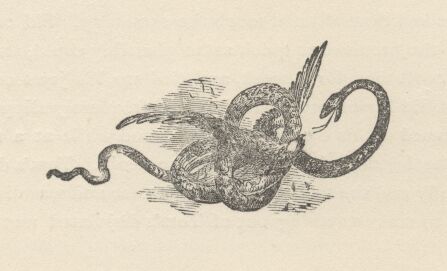
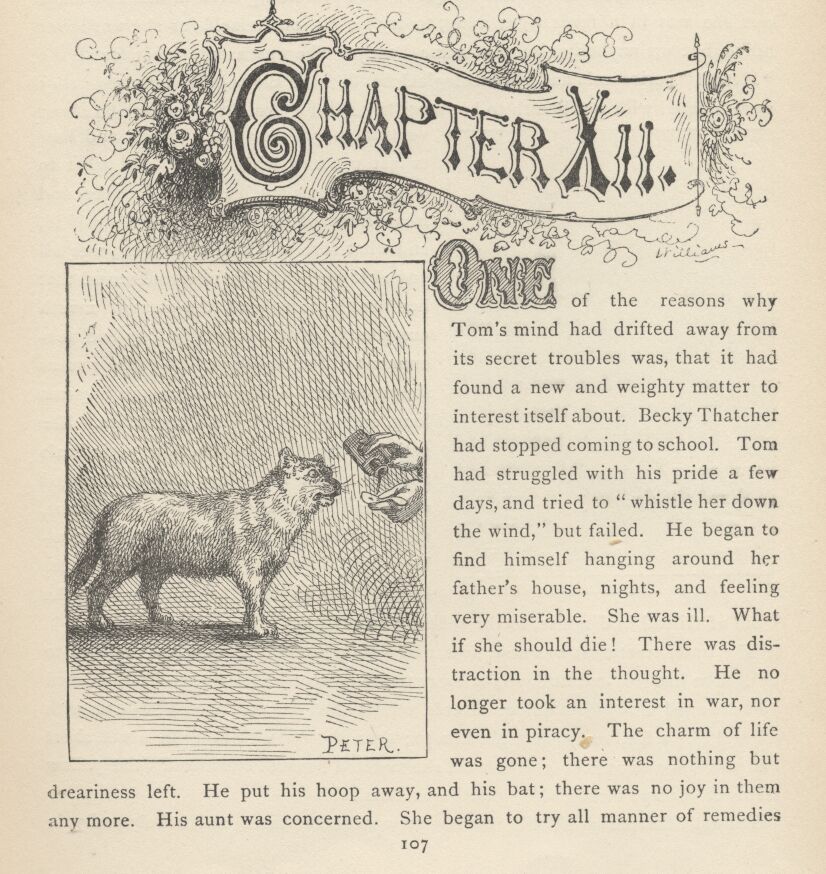
ONE of the reasons why Tom's mind had drifted away from its secret troubles was, that it had found a new and weighty matter to interest itself about. Becky Thatcher had stopped coming to school. Tom had struggled with his pride a few days, and tried to "whistle her down the wind," but failed. He began to find himself hanging around her father's house, nights, and feeling very miserable. She was ill. What if she should die! There was distraction in the thought. He no longer took an interest in war, nor even in piracy. The charm of life was gone; there was nothing but dreariness left. He put his hoop away, and his bat; there was no joy in them any more. His aunt was concerned. She began to try all manner of remedies on him. She was one of those people who are infatuated with patent medicines and all new-fangled methods of producing health or mending it. She was an inveterate experimenter in these things. When something fresh in this line came out she was in a fever, right away, to try it; not on herself, for she was never ailing, but on anybody else that came handy. She was a subscriber for all the "Health" periodicals and phrenological frauds; and the solemn ignorance they were inflated with was breath to her nostrils. All the "rot" they contained about ventilation, and how to go to bed, and how to get up, and what to eat, and what to drink, and how much exercise to take, and what frame of mind to keep one's self in, and what sort of clothing to wear, was all gospel to her, and she never observed that her health-journals of the current month customarily upset everything they had recommended the month before. She was as simple-hearted and honest as the day was long, and so she was an easy victim. She gathered together her quack periodicals and her quack medicines, and thus armed with death, went about on her pale horse, metaphorically speaking, with "hell following after." But she never suspected that she was not an angel of healing and the balm of Gilead in disguise, to the suffering neighbors.
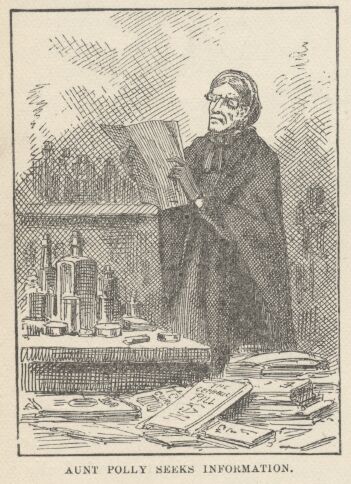
The water treatment was new, now, and Tom's low condition was a windfall to her. She had him out at daylight every morning, stood him up in the wood-shed and drowned him with a deluge of cold water; then she scrubbed him down with a towel like a file, and so brought him to; then she rolled him up in a wet sheet and put him away under blankets till she sweated his soul clean and "the yellow stains of it came through his pores"—as Tom said.
Yet notwithstanding all this, the boy grew more and more melancholy and pale and dejected. She added hot baths, sitz baths, shower baths, and plunges. The boy remained as dismal as a hearse. She began to assist the water with a slim oatmeal diet and blister-plasters. She calculated his capacity as she would a jug's, and filled him up every day with quack cure-alls.
Tom had become indifferent to persecution by this time. This phase filled the old lady's heart with consternation. This indifference must be broken up at any cost. Now she heard of Pain-killer for the first time. She ordered a lot at once. She tasted it and was filled with gratitude. It was simply fire in a liquid form. She dropped the water treatment and everything else, and pinned her faith to Pain-killer. She gave Tom a teaspoonful and watched with the deepest anxiety for the result. Her troubles were instantly at rest, her soul at peace again; for the "indifference" was broken up. The boy could not have shown a wilder, heartier interest, if she had built a fire under him.
Tom felt that it was time to wake up; this sort of life might be romantic enough, in his blighted condition, but it was getting to have too little sentiment and too much distracting variety about it. So he thought over various plans for relief, and finally hit upon that of professing to be fond of Pain-killer. He asked for it so often that he became a nuisance, and his aunt ended by telling him to help himself and quit bothering her. If it had been Sid, she would have had no misgivings to alloy her delight; but since it was Tom, she watched the bottle clandestinely. She found that the medicine did really diminish, but it did not occur to her that the boy was mending the health of a crack in the sitting-room floor with it.
One day Tom was in the act of dosing the crack when his aunt's yellow cat came along, purring, eyeing the teaspoon avariciously, and begging for a taste. Tom said:
"Don't ask for it unless you want it, Peter."
But Peter signified that he did want it.
"You better make sure."
Peter was sure.
"Now you've asked for it, and I'll give it to you, because there ain't anything mean about me; but if you find you don't like it, you mustn't blame anybody but your own self."
Peter was agreeable. So Tom pried his mouth open and poured down the Pain-killer. Peter sprang a couple of yards in the air, and then delivered a war-whoop and set off round and round the room, banging against furniture, upsetting flower-pots, and making general havoc. Next he rose on his hind feet and pranced around, in a frenzy of enjoyment, with his head over his shoulder and his voice proclaiming his unappeasable happiness. Then he went tearing around the house again spreading chaos and destruction in his path. Aunt Polly entered in time to see him throw a few double summersets, deliver a final mighty hurrah, and sail through the open window, carrying the rest of the flower-pots with him. The old lady stood petrified with astonishment, peering over her glasses; Tom lay on the floor expiring with laughter.
"Tom, what on earth ails that cat?"
"I don't know, aunt," gasped the boy.
"Why, I never see anything like it. What did make him act so?"
"Deed I don't know, Aunt Polly; cats always act so when they're having a good time."
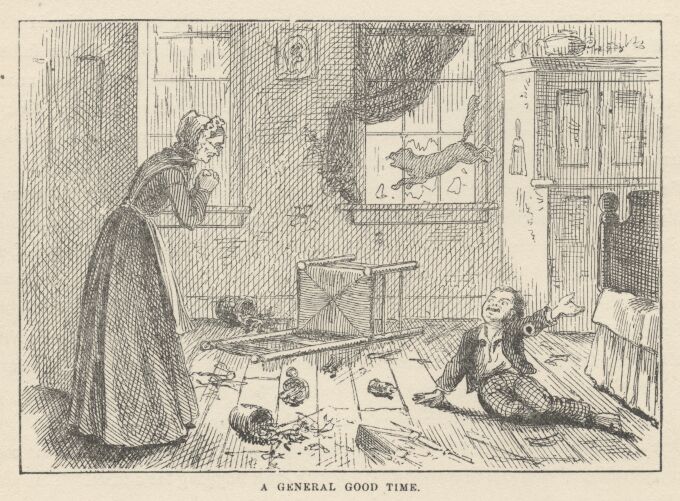
"They do, do they?" There was something in the tone that made Tom apprehensive.
"Yes'm. That is, I believe they do."
"You DO?"
"Yes'm."
The old lady was bending down, Tom watching, with interest emphasized by anxiety. Too late he divined her "drift." The handle of the telltale tea-spoon was visible under the bed-valance. Aunt Polly took it, held it up. Tom winced, and dropped his eyes. Aunt Polly raised him by the usual handle—his ear—and cracked his head soundly with her thimble.
"Now, sir, what did you want to treat that poor dumb beast so, for?"
"I done it out of pity for him—because he hadn't any aunt."
"Hadn't any aunt!—you numskull. What has that got to do with it?"
"Heaps. Because if he'd had one she'd a burnt him out herself! She'd a roasted his bowels out of him 'thout any more feeling than if he was a human!"
Aunt Polly felt a sudden pang of remorse. This was putting the thing in a new light; what was cruelty to a cat MIGHT be cruelty to a boy, too. She began to soften; she felt sorry. Her eyes watered a little, and she put her hand on Tom's head and said gently:
"I was meaning for the best, Tom. And, Tom, it DID do you good."
Tom looked up in her face with just a perceptible twinkle peeping through his gravity.
"I know you was meaning for the best, aunty, and so was I with Peter. It done HIM good, too. I never see him get around so since—"
"Oh, go 'long with you, Tom, before you aggravate me again. And you try and see if you can't be a good boy, for once, and you needn't take any more medicine."
Tom reached school ahead of time. It was noticed that this strange thing had been occurring every day latterly. And now, as usual of late, he hung about the gate of the schoolyard instead of playing with his comrades. He was sick, he said, and he looked it. He tried to seem to be looking everywhere but whither he really was looking—down the road. Presently Jeff Thatcher hove in sight, and Tom's face lighted; he gazed a moment, and then turned sorrowfully away. When Jeff arrived, Tom accosted him; and "led up" warily to opportunities for remark about Becky, but the giddy lad never could see the bait. Tom watched and watched, hoping whenever a frisking frock came in sight, and hating the owner of it as soon as he saw she was not the right one. At last frocks ceased to appear, and he dropped hopelessly into the dumps; he entered the empty schoolhouse and sat down to suffer. Then one more frock passed in at the gate, and Tom's heart gave a great bound. The next instant he was out, and "going on" like an Indian; yelling, laughing, chasing boys, jumping over the fence at risk of life and limb, throwing handsprings, standing on his head—doing all the heroic things he could conceive of, and keeping a furtive eye out, all the while, to see if Becky Thatcher was noticing. But she seemed to be unconscious of it all; she never looked. Could it be possible that she was not aware that he was there? He carried his exploits to her immediate vicinity; came war-whooping around, snatched a boy's cap, hurled it to the roof of the schoolhouse, broke through a group of boys, tumbling them in every direction, and fell sprawling, himself, under Becky's nose, almost upsetting her—and she turned, with her nose in the air, and he heard her say: "Mf! some people think they're mighty smart—always showing off!"
Tom's cheeks burned. He gathered himself up and sneaked off, crushed and crestfallen.
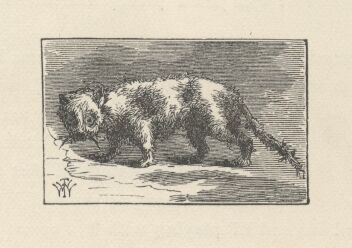
*** END OF THE PROJECT GUTENBERG EBOOK TOM SAWYER, TWAIN, V3 ***
***** This file should be named saw311h.html or saw311h.zip ****
Corrected EDITIONS of our eBooks get a new NUMBER, saw312h.html
VERSIONS based on separate sources get new LETTER, saw311ha.html
This eBook was produced by David Widger, [widger@cecomet.net]
Project Gutenberg eBooks are often created from several printed
editions, all of which are confirmed as Public Domain in the US
unless a copyright notice is included. Thus, we usually do not
keep eBooks in compliance with any particular paper edition.
We are now trying to release all our eBooks one year in advance
of the official release dates, leaving time for better editing.
Please be encouraged to tell us about any error or corrections,
even years after the official publication date.
Please note neither this listing nor its contents are final til
midnight of the last day of the month of any such announcement.
The official release date of all Project Gutenberg eBooks is at
Midnight, Central Time, of the last day of the stated month. A
preliminary version may often be posted for suggestion, comment
and editing by those who wish to do so.
Most people start at our Web sites at:
http://gutenberg.net or
http://promo.net/pg
These Web sites include award-winning information about Project
Gutenberg, including how to donate, how to help produce our new
eBooks, and how to subscribe to our email newsletter (free!).
Those of you who want to download any eBook before announcement
can get to them as follows, and just download by date. This is
also a good way to get them instantly upon announcement, as the
indexes our cataloguers produce obviously take a while after an
announcement goes out in the Project Gutenberg Newsletter.
http://www.ibiblio.org/gutenberg/etext03 or
ftp://ftp.ibiblio.org/pub/docs/books/gutenberg/etext03
Or /etext02, 01, 00, 99, 98, 97, 96, 95, 94, 93, 92, 92, 91 or 90
Just search by the first five letters of the filename you want,
as it appears in our Newsletters.
Information about Project Gutenberg (one page)
We produce about two million dollars for each hour we work. The
time it takes us, a rather conservative estimate, is fifty hours
to get any eBook selected, entered, proofread, edited, copyright
searched and analyzed, the copyright letters written, etc. Our
projected audience is one hundred million readers. If the value
per text is nominally estimated at one dollar then we produce $2
million dollars per hour in 2002 as we release over 100 new text
files per month: 1240 more eBooks in 2001 for a total of 4000+
We are already on our way to trying for 2000 more eBooks in 2002
If they reach just 1-2% of the world's population then the total
will reach over half a trillion eBooks given away by year's end.
The Goal of Project Gutenberg is to Give Away 1 Trillion eBooks!
This is ten thousand titles each to one hundred million readers,
which is only about 4% of the present number of computer users.
Here is the briefest record of our progress (* means estimated):
eBooks Year Month
1 1971 July
10 1991 January
100 1994 January
1000 1997 August
1500 1998 October
2000 1999 December
2500 2000 December
3000 2001 November
4000 2001 October/November
6000 2002 December*
9000 2003 November*
10000 2004 January*
The Project Gutenberg Literary Archive Foundation has been created
to secure a future for Project Gutenberg into the next millennium.
We need your donations more than ever!
As of February, 2002, contributions are being solicited from people
and organizations in: Alabama, Alaska, Arkansas, Connecticut,
Delaware, District of Columbia, Florida, Georgia, Hawaii, Illinois,
Indiana, Iowa, Kansas, Kentucky, Louisiana, Maine, Massachusetts,
Michigan, Mississippi, Missouri, Montana, Nebraska, Nevada, New
Hampshire, New Jersey, New Mexico, New York, North Carolina, Ohio,
Oklahoma, Oregon, Pennsylvania, Rhode Island, South Carolina, South
Dakota, Tennessee, Texas, Utah, Vermont, Virginia, Washington, West
Virginia, Wisconsin, and Wyoming.
We have filed in all 50 states now, but these are the only ones
that have responded.
As the requirements for other states are met, additions to this list
will be made and fund raising will begin in the additional states.
Please feel free to ask to check the status of your state.
In answer to various questions we have received on this:
We are constantly working on finishing the paperwork to legally
request donations in all 50 states. If your state is not listed and
you would like to know if we have added it since the list you have,
just ask.
While we cannot solicit donations from people in states where we are
not yet registered, we know of no prohibition against accepting
donations from donors in these states who approach us with an offer to
donate.
International donations are accepted, but we don't know ANYTHING about
how to make them tax-deductible, or even if they CAN be made
deductible, and don't have the staff to handle it even if there are
ways.
Donations by check or money order may be sent to:
Project Gutenberg Literary Archive Foundation
PMB 113
1739 University Ave.
Oxford, MS 38655-4109
Contact us if you want to arrange for a wire transfer or payment
method other than by check or money order.
The Project Gutenberg Literary Archive Foundation has been approved by
the US Internal Revenue Service as a 501(c)(3) organization with EIN
[Employee Identification Number] 64-622154. Donations are
tax-deductible to the maximum extent permitted by law. As fund-raising
requirements for other states are met, additions to this list will be
made and fund-raising will begin in the additional states.
We need your donations more than ever!
You can get up to date donation information online at:
http://www.gutenberg.net/donation.html
***
If you can't reach Project Gutenberg,
you can always email directly to:
Michael S. Hart [hart@pobox.com]
Prof. Hart will answer or forward your message.
We would prefer to send you information by email.
**The Legal Small Print**
(Three Pages)
***START**THE SMALL PRINT!**FOR PUBLIC DOMAIN EBOOKS**START***
Why is this "Small Print!" statement here? You know: lawyers.
They tell us you might sue us if there is something wrong with
your copy of this eBook, even if you got it for free from
someone other than us, and even if what's wrong is not our
fault. So, among other things, this "Small Print!" statement
disclaims most of our liability to you. It also tells you how
you may distribute copies of this eBook if you want to.
*BEFORE!* YOU USE OR READ THIS EBOOK
By using or reading any part of this PROJECT GUTENBERG-tm
eBook, you indicate that you understand, agree to and accept
this "Small Print!" statement. If you do not, you can receive
a refund of the money (if any) you paid for this eBook by
sending a request within 30 days of receiving it to the person
you got it from. If you received this eBook on a physical
medium (such as a disk), you must return it with your request.
ABOUT PROJECT GUTENBERG-TM EBOOKS
This PROJECT GUTENBERG-tm eBook, like most PROJECT GUTENBERG-tm eBooks,
is a "public domain" work distributed by Professor Michael S. Hart
through the Project Gutenberg Association (the "Project").
Among other things, this means that no one owns a United States copyright
on or for this work, so the Project (and you!) can copy and
distribute it in the United States without permission and
without paying copyright royalties. Special rules, set forth
below, apply if you wish to copy and distribute this eBook
under the "PROJECT GUTENBERG" trademark.
Please do not use the "PROJECT GUTENBERG" trademark to market
any commercial products without permission.
To create these eBooks, the Project expends considerable
efforts to identify, transcribe and proofread public domain
works. Despite these efforts, the Project's eBooks and any
medium they may be on may contain "Defects". Among other
things, Defects may take the form of incomplete, inaccurate or
corrupt data, transcription errors, a copyright or other
intellectual property infringement, a defective or damaged
disk or other eBook medium, a computer virus, or computer
codes that damage or cannot be read by your equipment.
LIMITED WARRANTY; DISCLAIMER OF DAMAGES
But for the "Right of Replacement or Refund" described below,
[1] Michael Hart and the Foundation (and any other party you may
receive this eBook from as a PROJECT GUTENBERG-tm eBook) disclaims
all liability to you for damages, costs and expenses, including
legal fees, and [2] YOU HAVE NO REMEDIES FOR NEGLIGENCE OR
UNDER STRICT LIABILITY, OR FOR BREACH OF WARRANTY OR CONTRACT,
INCLUDING BUT NOT LIMITED TO INDIRECT, CONSEQUENTIAL, PUNITIVE
OR INCIDENTAL DAMAGES, EVEN IF YOU GIVE NOTICE OF THE
POSSIBILITY OF SUCH DAMAGES.
If you discover a Defect in this eBook within 90 days of
receiving it, you can receive a refund of the money (if any)
you paid for it by sending an explanatory note within that
time to the person you received it from. If you received it
on a physical medium, you must return it with your note, and
such person may choose to alternatively give you a replacement
copy. If you received it electronically, such person may
choose to alternatively give you a second opportunity to
receive it electronically.
THIS EBOOK IS OTHERWISE PROVIDED TO YOU "AS-IS". NO OTHER
WARRANTIES OF ANY KIND, EXPRESS OR IMPLIED, ARE MADE TO YOU AS
TO THE EBOOK OR ANY MEDIUM IT MAY BE ON, INCLUDING BUT NOT
LIMITED TO WARRANTIES OF MERCHANTABILITY OR FITNESS FOR A
PARTICULAR PURPOSE.
Some states do not allow disclaimers of implied warranties or
the exclusion or limitation of consequential damages, so the
above disclaimers and exclusions may not apply to you, and you
may have other legal rights.
INDEMNITY
You will indemnify and hold Michael Hart, the Foundation,
and its trustees and agents, and any volunteers associated
with the production and distribution of Project Gutenberg-tm
texts harmless, from all liability, cost and expense, including
legal fees, that arise directly or indirectly from any of the
following that you do or cause: [1] distribution of this eBook,
[2] alteration, modification, or addition to the eBook,
or [3] any Defect.
DISTRIBUTION UNDER "PROJECT GUTENBERG-tm"
You may distribute copies of this eBook electronically, or by
disk, book or any other medium if you either delete this
"Small Print!" and all other references to Project Gutenberg,
or:
[1] Only give exact copies of it. Among other things, this
requires that you do not remove, alter or modify the
eBook or this "small print!" statement. You may however,
if you wish, distribute this eBook in machine readable
binary, compressed, mark-up, or proprietary form,
including any form resulting from conversion by word
processing or hypertext software, but only so long as
*EITHER*:
[*] The eBook, when displayed, is clearly readable, and
does *not* contain characters other than those
intended by the author of the work, although tilde
(~), asterisk (*) and underline (_) characters may
be used to convey punctuation intended by the
author, and additional characters may be used to
indicate hypertext links; OR
[*] The eBook may be readily converted by the reader at
no expense into plain ASCII, EBCDIC or equivalent
form by the program that displays the eBook (as is
the case, for instance, with most word processors);
OR
[*] You provide, or agree to also provide on request at
no additional cost, fee or expense, a copy of the
eBook in its original plain ASCII form (or in EBCDIC
or other equivalent proprietary form).
[2] Honor the eBook refund and replacement provisions of this
"Small Print!" statement.
[3] Pay a trademark license fee to the Foundation of 20% of the
gross profits you derive calculated using the method you
already use to calculate your applicable taxes. If you
don't derive profits, no royalty is due. Royalties are
payable to "Project Gutenberg Literary Archive Foundation"
the 60 days following each date you prepare (or were
legally required to prepare) your annual (or equivalent
periodic) tax return. Please contact us beforehand to
let us know your plans and to work out the details.
WHAT IF YOU *WANT* TO SEND MONEY EVEN IF YOU DON'T HAVE TO?
Project Gutenberg is dedicated to increasing the number of
public domain and licensed works that can be freely distributed
in machine readable form.
The Project gratefully accepts contributions of money, time,
public domain materials, or royalty free copyright licenses.
Money should be paid to the:
"Project Gutenberg Literary Archive Foundation."
If you are interested in contributing scanning equipment or
software or other items, please contact Michael Hart at:
hart@pobox.com
[Portions of this eBook's header and trailer may be reprinted only
when distributed free of all fees. Copyright (C) 2001, 2002 by
Michael S. Hart. Project Gutenberg is a TradeMark and may not be
used in any sales of Project Gutenberg eBooks or other materials be
they hardware or software or any other related product without
express permission.]
*END THE SMALL PRINT! FOR PUBLIC DOMAIN EBOOKS*Ver.02/11/02*END*